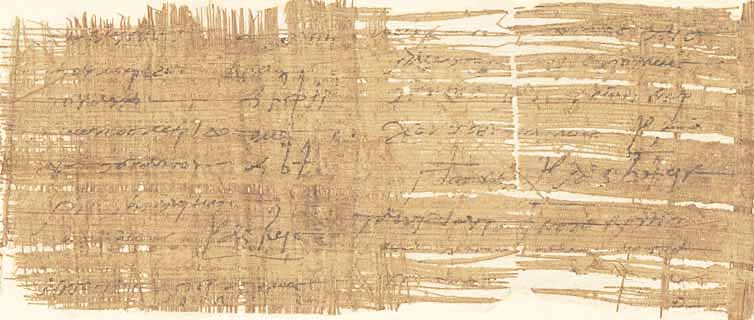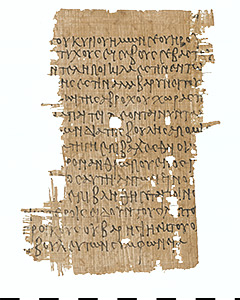SB XIV 11876 (P. 7216)
This papyrus contains a decision of the Roman Emperor Caracalla from the years shortly after 215 AD, which deals with a disputed tax issue that has been brought to him by his legal adviser Egnatius Lollianus during his visit to Egypt.
The papyrus was part of the private collection of the Egyptologist Heinrich Brugsch and came to the Berlin Papyrus Collection in 1891. It is unknown where this papyrus was found in Egypt but the oasis Fayum in Middle Egypt is very likely. The content of the text even allows us to assume that it was written in Karanis, a village in the north-eastern part of the Fayum. There a copy of the same decision was found, which differs only in some details from the text in Berlin. It is now housed in Ann Arbor (USA). This second copy is in a much worse condition than the Berlin text. Nevertheless, it helps us to supplement with some certainty much of the lost line-beginnings on the left part.
The preserved text has a heading, a short summary of the case by Lollianus and the decision of the Emperor. Lollianus’ argument contains two parts. First, he is summarizing complaints of peasants of a certain nome (district): The tax-farmer of several taxes in this nome has applied a certain tax called monodesmia, which consisted of several taxes and was due on state land, also on land which was not reached by the Nile flood and was, therefore, without or with inferior crops. The nome can only be the Arsinoites, i.e. the ancient name of a district in the region of the Fayum, because the Monodesmia was applied only there as far as we know from our texts. Tax-farming was very common in these times, though the farming of Monodesmia is only attested in this text. We know from tax receipts for Monodesmia that it was usually collected by the elders of a village and then paid into a central treasury of the nome which was managed by the so-called nomarch. On the level of the nome he was responsible for the collection of this tax. Therefore, it seems clear that the complaints of the peasants, which are summarized by Lollianus in this text, are directed against the nomarch, even though it is unusual that he is called a tax-farmer in this text. By chance we know the name of the person who was nomarch during this period from other texts. It was an Apion, who was the target of a couple of other complaints, too.
In the second part Lollianus offers a solution to solve the problem. His suggestion is very general and it can be understood as a general criticism on the praxis of collecting taxes in this period. He criticized that the duties and competences of a nomarch were very large. In his opinion it was too much for one person. He suggested that the organization of the tax-farming should be organized by the council of Ptolemais Euergetes, the capital of the nome, and that it should be given to more than one person.
The Emperor Caracalla agreed with Lollianus’ argument and decided, that the Monodesmia should only be collected from those landowners, whose land was reached by the flood and produced more crops. Furthermore, the council of Ptolemais Euergetes should be responsible for the collection of tax, which would help to relieve owners of less productive or unirrigated land.
This text gives us some interesting insight into the problems which could arise during tax collection. We know from later texts that the suggestions of Lollianus have apparently been realized. The duties of a nomarchs were divided and fulfilled by more than one person.



